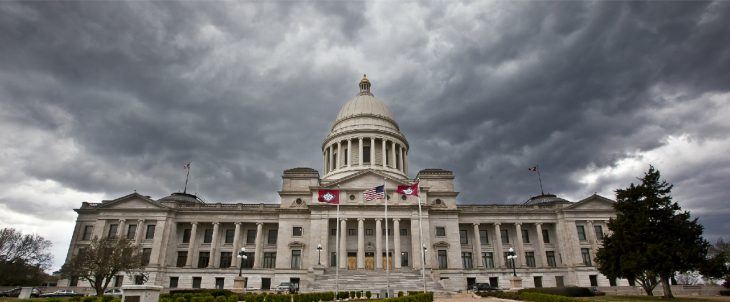Governor puts 9 action items on special session call; starts Tuesday
by March 12, 2018 10:33 pm 566 views

It may be known as the PBM special session, but there will be everything from hogs to bingo to highways and 529 plans included in the first special session of the 91st General Assembly.
On Tuesday, lawmakers will meet at 9:00 a.m. at the state capitol just hours after they wrapped up their fiscal session to deal with nine items that Gov. Asa Hutchinson deemed important enough for immediate attention.
“Prior to the fiscal session, a number of matters that warranted immediate action by the legislature were brought to my attention, including issues such as highway funding and pharmacy benefit manager oversight legislation,” Hutchinson said.
“I made a commitment then to hold a special session following the Fiscal session to address these items, as well as other issues deemed unique in circumstance, if legislators could reach a two-thirds consensus in both chambers. The items on the call reflect that commitment, and I look forward to working with the legislature to address these issues in a quick and efficient manner over the next three days.”
In all, there are nine extraordinary legislative items for lawmakers to consider in what is expected to be a three-day special session. They include:
PBMs – After a spike in pharmacy reimbursement rates to start the new year off, legislators have pressed hard to further regulate pharmacy benefit managers, also known as PBMs. The Arkansas Insurance Department will have oversight over the industry and presumably gain a new set of tools to monitor, enforce, and regulate PBMs.
Highways – Making technical corrections to state law in order to comply with federal law concerning highway funding. Failure to do so could result in the state losing nearly $11 million in federal highway funding. The issue centers around changes to the definition of alcoholic beverages, motor vehicles, and open alcoholic beverage containers.
529 plans – This issue nearly derailed the fiscal session. Federal 529 savings accounts have allowed participants to escape taxes up to a certain amount through this deferred college savings plan. There is debate that federal law now allows for 529s to be used for primary and secondary educational institutions.
Bingo – Lawmakers will make technical corrections concerning the definition of equipment used by charitable organizations in licensed bingo games. It will allow for visually impaired participants to include electronic devices used to mark a bingo face or an electronic facsimile of a paper bingo sheet, within certain limitations and conditions approved by the Director of the Department of Finance and Administration.
Trials – This call item affects a contractual waiver of the right to a jury trial by creating an enforceable agreement whereby the parties agree to waive their respective rights to a jury trial before or after a lawsuit is filed.
Liquid animal waste – A controversial hog farm near the Buffalo River has sparked a potential permit change process at the Arkansas Department of Environmental Quality. The push will be to make it transferrable to convert a general permit under ADEQ’s Regulation 5 into an individual permit, which would eliminate a five-year permit renewal requirement for farms that must disperse liquid animal waste.
ATVs – Measures related to this issue would loosen requirements for all-terrain vehicle owners and allow them to use off-road trails, limit the requirement of providing proof of property interest, and remove the limitation of driving more than three miles on a public street or highway in certain instances.
Parks – When trail projects, a growing outdoor business in Arkansas, are designed and constructed, they are managed by the Building Authority Division of the Department of Finance and Administration. An effort will be made to transfer that oversight authority to the State Parks, Recreation and Travel Commission.
Students – According to the governor’s call, there is a need to amend the Arkansas code concerning how siblings are to be treated in the counting of transfer students by allowing siblings to meet or exceed the 3% cap found in state education guidelines.
